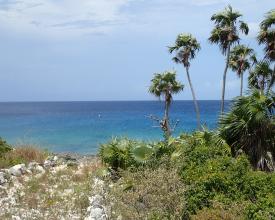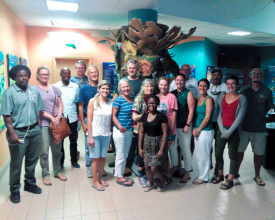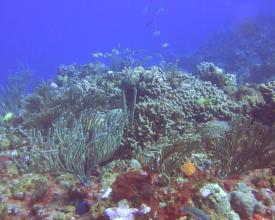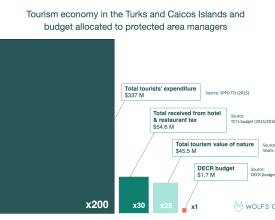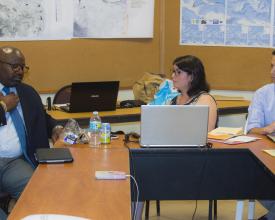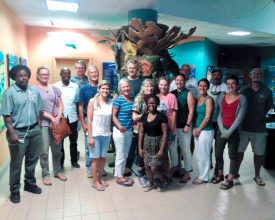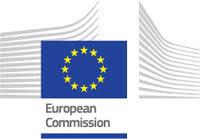
Stimulating sustainable financing for long-term coral reef conservation in the Turks and Caicos Islands
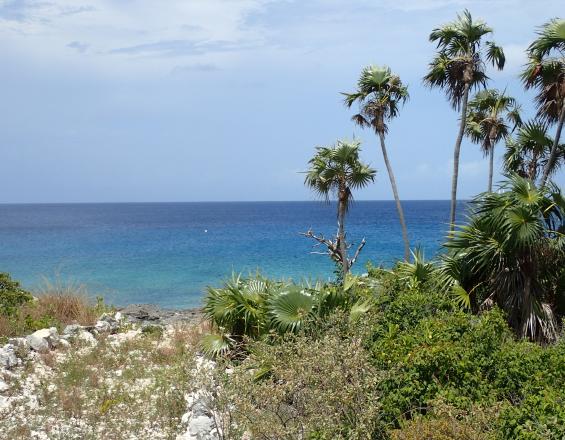
The Turks and Caicos Islands (TCI) economy largely relies on tourism, which in turn is heavily dependent on natural landscapes, clean coastal waterways and vibrant coral reefs. Although TCI’s ecosystems are integral to the local economy, there is a disconnect between the benefits these generate and the investments made in their management.
To bridge the financing gap for effective marine protected area management, a collaborative initiative with the Department of Environment and Coastal Resources (DECR) focused on three strategic actions: identifying feasible mechanisms for long-term conservation financing; building the case for protected area and coral reef funding; and building capacity to monitor and report impacts of coral reef conservation. Through engagement with protected area managers and decision makers, the initiative increased support towards concrete financing solutions. As a result, a working group of relevant ministries was initiated to reinstate a national environmental fund.
Contexte
Challenges addressed
- Decision makers responsible for government budget allocation face competing priorities in every budget cycle.
- While the case for increased funding for nature management built on clear links between healthy ecosystems and the tourism economy, further arguments on the urgency of coral reef protection could still be required to strengthen subsequent budget requests.
- Additional follow up among project partners beyond the official implementation schedule was fundamental to deal with the impacts of staff turnover and maintain new managers informed of and engaged in both, the communication of a strong business case for funding, and the transfer of technical capacities for coral reef monitoring to new staff.
Emplacement
Traiter
Summary of the process
The building blocks were implemented in a sequential process with increasing degrees of specificity.
The first building block consisted of a broad analysis of existing and potential mechanisms to fund conservation activities in TCI. This provided recommendations on feasible strategic paths.
Following the proposed strategies, the second building block focused on producing the most relevant evidence to support the case for increased funding to protected areas, emphasizing the supporting role of ecosystems such as coral reefs within the tourism economy.
Finally, the third building block developed specific capacities required to generate further evidence for increased protected area funding over time. This building block focused specifically on coral reefs, as well as monitoring and reporting capacities.
Building Blocks
Identifying mechanisms for long-term financing of protected areas and coral reef conservation
The Gulf and Caribbean Fisheries Institute (GCFI) supported technical assistance for stakeholder meetings to discuss sustainable finance strategies for marine protected areas in TCI in 2015.
Possible strategies were formulated in consultation with stakeholders by using the Wolfs Company's Eco2Fin framework, an approach to assess current and potential financing streams based on context-specific conditions. This assessment revealed the diversity of fees and taxes charged to tourists, as well as the lack of earmarked government revenue for protected area management. It also concluded that tourism-related revenue offered untapped opportunities to finance marine protected areas, given that these contain key tourism assets such as coral reefs.
A subsequent analysis of TCI's legal framework provided recommendations on feasible mechanisms to increase budgetary allocations and earmark conservation funds for marine protected areas managers such as DECR. Strategic steps formulated to achieve the succesful implementation of these mechanisms included the development of a business case for increased funding of protected areas and key ecosystems such as coral reefs.
Enabling factors
- The willingness of stakeholders from different sectors to collaborate and participate in meetings was essential to produce results that could be subsequently adopted.
- A supportive tourism sector was also a key enabling aspect.
- Legal expertise was necessary to identify feasible mechanisms within the existing legal framework.
- External funding and in-kind support for follow-up actions were key to support the implementation of recommendations.
Lesson learned
The use of simple and structured approaches, as well as external facilitation, allowed a fluid communication among stakeholders. The underlying analysis of the governance and socioeconomic context helped identify options that could leverage stakeholder support since the inception.
Building the case for increased funding for protected area and coral reef management
DECR is one of the main protected area managers in TCI. As a government department, DECR depends on funding allocated through a regular budget cycle. Although the government collects a number of fees and taxes that are linked to nature-dependent sectors such as tourism, none of these payments is earmarked to protected area management. Instead, these funds flow to the consolidated fund, from which they are redistributed across public entities.
Building a strong case for protected area management was fundamental for DECR to promote: 1. increasing funding through the regular budget cycle, and 2. earmarking of a portion of nature-related revenues.
To support DECR in this task, GCFI funded technical assistance for the estimation of budget needs and gaps for basic and optimal protected area management. In addition, an assessment of the tourism value of nature was conducted based on existing studies. By comparing these figures, DECR could show authorities that increasing funding was financially reasonable, given that its operating budget in the year under analysis (2015/2016) was 25 times smaller than the added value of nature for tourism and 30 times smaller than the nature-related tourism revenue for the government.
Enabling factors
- Active participation of DECR staff in different functional areas to help establish specific budget needs.
- Availability of 'willingness to pay' studies in neighbouring countries and territories with similar visitor profiles.
- Availability of information from tourist exit survey.
Lesson learned
Active involvement of various DECR representatives in the preparation of the business case was fundamental due to the following reasons:
- Key staff should have a good understanding of the information presented in the business case and the methods used, so that this can be used and updated in the future.
- Key staff should also be able to effectively communicate the business case to stakeholders.
- If any staff members leaves the institution, then other members involved in the process should be able to transfer the information internally.
Building capacity to monitor and report impacts of coral reef conservation
As part of the regular government budget cycle, DECR submits a selection of output and outcome indicators to demonstrate progress and justify funding requests. Capacities to track the state of ecosystems are therefore relevant not only to support conservation, but also as means for the department to report on its performance.
This building block therefore focused on the development of capacities to monitor ecosystem health and use monitoring results to communicate the benefits of ecosystem management. These capacities were built with support from the BEST 2.0 Programme funded by the European Union, focusing on coral reefs in the Key Biodiversity Area of Princess Alexandra Land and Sea National Park, as a pilot project.
This included the implementation of a training program for DECR staff and partners in the use of the Atlantic and Gulf Rapid Reef Assessment (AGRRA) methods and the development of a tailored Reef Health Index (RHI) for TCI. The RHI itself and the underlying indicators were recommended as Key Performance Indicators (KPIs) for DECR to report on their activities. In addition, further KPIs were compiled for DECR to monitor social and economic outcomes that could be associated to coral reef health, and hence, to their conservation activities.
Enabling factors
- Active participation of in-house staff and other marine protected area managers.
- Availability of skilled staff and partners (i.e. experienced divers) that can implement monitoring activities beyond the training program.
- Availability of equipment (e.g. dive equipment, boats and materials) to support on-site activities such as AGRRA training dives.
Lesson learned
Ensuring participation of partners with a solid relationship of cooperation and in-house staff with career building opportunities within the organization is fundamental to ensure that the capacities built will have an impact in the long term. As some of the trained staff took alternative professional paths after the training, the capacity to follow up on monitoring was partly affected. In relation to this point, it is also key that capacity building activities are articulated in a long-term plan that ensures future follow up and implementation.
Impacts
Improved collaboration for conservation finance
The initiative identified long-term financing solutions for protected areas, such as ring-fencing part of the nature-related revenue. Support by high-level stakeholders was obtained and they expressed willingness to evaluate fund allocation to coral-reef monitoring through the regular budget cycle. A working group of decision makers from key ministries was created to discuss the reinstatement of a fund for long-term ecosystem management.
Improved coral reef management through strengthened monitoring capacities
DECR and civil society partners were trained in coral reef monitoring methods and in communicating monitoring results to key stakeholders. The capacity to work with socioeconomic and ecological monitoring indicators (such as the Atlantic Gulf Rapid Reef Assessment's Reef Health Index) and incorporating them into their management practices was improved.
Improved communication of the benefits obtained from ecosystems
The evidence produced created greater awareness among decision makers of the economy’s dependency on healthy coral reefs, the main threats to coral reef health and the environmental and economic effects of coral reef degradation. Building on this information, a business case was prepared for DECR to justify increased funding for natural resource management.
Beneficiaries
Department of Environment and Natural Resources of the Turks and Caicos Islands.
Princess Alexandra Land and Sea National Park in Turks and Caicos Islands.

